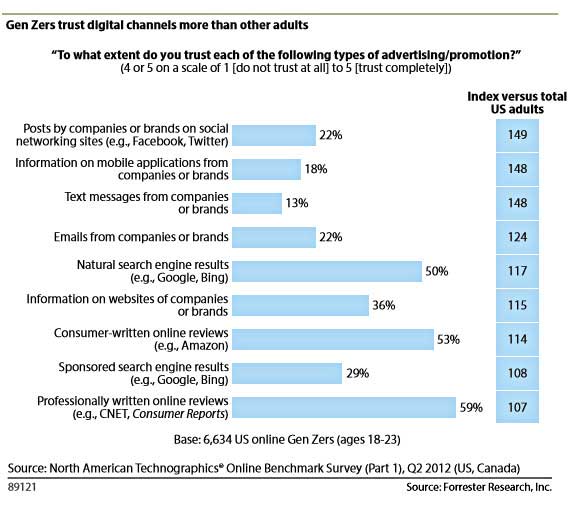Members of Generation Z, those now age 18-23, tend to be indiscriminate with their media choices and are more likely than other generations to embrace and trust online communications such as social and mobile media and email, according to a report by Forrester Research.
Raised in the age of technology, Gen-Z audiences know the world only as a digital one—where they can connect anytime, anywhere, and to anyone. They will likely be the first generation to consume more media online than offline, according to Forrester's report.
Moreover, Gen-Z audiences are often distracted with multiple forms of media: 84% multitask with an Internet-connected device while watching TV—using on average 1.5 other Internet-connected devices (e.g., laptops and cell phones).
Below, additional findings from the report titled "How To Build Your Brand With Generation Z," by Forrester Research.
Gen-Z audiences appear to trust online content (e.g., ads and promos) more than other generations.
Some 22% of surveyed Gen-Z consumers say they trust somewhat or trust completely posts by companies or brands on social networking sites. That level is roughly 49% higher than other generations.
Similarly, Gen-Z consumers are 48% more likely than other generations to trust somewhat or completely the content on mobile applications from brands, as well as text messages from brands.

Because Gen-Z audiences are exposed to so many brand choices, they tend to be demanding consumers, Forrester found.
"Gen-Zers are open to a relationship with brands, as long as those brands are authentic and live up to their high expectations and consistently deliver what they need," writes the report’s author Tracy Stokes, in a recent blog post.
Stokes offers key insights on how marketers can build their brands with Gen-Z audiences:
- Practice participation, not persuasion. Gen Z grew up with two-way brand conversations, so a traditional one-way sell won’t work. Invite them to participate in your brand via new and fresh experiences that earn their trust.
- Deliver a consistent brand experience online and offline. Gen Z see no distinction between the real and virtual worlds. So the experiences that brands offer must provide the same seamless experience.




